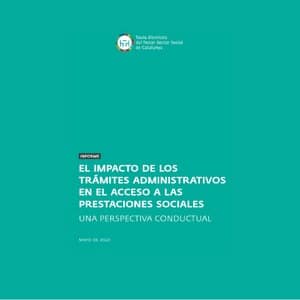
Without a proper understanding of how a social problem arises, it can be difficult to come up with the right social innovation to address it. Backed with data, research provides this link to social services. This Award honours research that provides knowledge that led to the development of evidence-based innovative initiatives in social services.

Homeless people often have difficulty accessing essential health services. This might be even more difficult with the growth in digital health as they may lack the means and knowledge to use these services. However, the increased application of digital health also provides an additional opportunity to reach out to previously excluded groups. DocRoom, Europe’s first evidence-based research project measuring the effects of digital health tools in the medical care of homeless people, was established to investigate the feasibility of telemedicine and digital health in the care of chronic diseases. Online visits were made available in community shelters in Budapest, Hungary, and the programme significantly improved care continuity and the use of relevant medical advances, while detecting high patient satisfaction. The project also represents a much-needed first-hand experience in this field and the best practices are shared through open-access scientific publications to maximise their impact across Europe.
Non-professional caregivers frequently feel as if they are ‘acting alone’ and are overburdened with little professional support, leading to increased levels of anxiety and depression. They are the focus of the Emotional Support and Mutual Help Groups (ESMHG) Programme, established in 2010. Each group, led by professionals (preferably psychologists) consists of between 10 and 15 caregivers, with ten face-to-face sessions where they can express their emotions and concerns about caregiving. In 2022, the programme’s impact and implementation were evaluated, assessing the changes in anxiety and depression levels in participants between the beginning and end of the programme. Most participants experienced a reduction in their level of anxiety (68% of participants), and their level of depression (54% of participants). On average, the level of anxiety in caregivers decreased by 29%, and their level of depression decreased by 25%. The evaluation identified opportunities to improve the programme, which are now being implemented.


DOST Index is a comprehensive tool for assessing and benchmarking social service provision performance across various factors by incorporating data from multiple sources and drawing insights using established analytical methods to ensure high-quality social services continue to be delivered to the population. The DOST Index is also a model for analysing back-office activities at macro-level and DOST centres at micro level with the aim of improving cooperation between them. Therefore, the Index comprises two components: the External DOST Index (for evaluating back-office performance) and the Internal DOST Index (for assessing front-office performance). The DOST Index is a tool for maintaining achieved service quality and customer satisfaction, identifying factors influencing the process, and managing interventions if problems are identified.
Social benefits are most effective when they reach the people they are intended to help as soon as possible. However, their design and implementation may prevent this goal from being achieved. Social innovation is required to overcome these obstacles, which may be caused by a normative flaw, digital impediments, or administrative bottlenecks. An expert study, involving administrators, non-profit organisations, and potential beneficiaries was carried out related to four essential Catalan social benefits: Minimum Vital Income; Guaranteed Citizenship Income; Rent Arrears Benefit; and Emergency Social Assistance for Families with Children 16 years and under. The analysis identified the main obstacles or problems a person requesting help might encounter when finding information about, requesting, or receiving social benefits.


This is a guide designed to promote co-production in the commissioning, design, delivery, and evaluation of social work. A work of co-production itself, the guide was co-produced during the pandemic (starting in January 2020) by a writing group of social workers and people with lived experience of services, almost entirely via video conference and digital communication. It provides an increased and applied understanding of what co-production is, why it is essential in social work, and evidence of case studies from across Northern Ireland that will equip the reader to put co-production into practice where they are. With endorsement from Health Minister Robin Swann, 100 people attended the virtual launch in November 2021. The writing group have committed to continue disseminating the guide and recently delivered an online workshop for Northern Ireland Social Care Council.
Three per-cent of the world’s population has an intellectual disability. Their physical fitness is significantly lower during all stages of their lives compared to those without an intellectual disability. Studies carried out with adults with intellectual disabilities show that there is a relationship between their physical condition and the ability to perform daily tasks, including work functionality, which shows the relevance of physical activity for broader well-being. This project developed an instrument to diagnose the physical condition of the person so that a personalised plan can be designed for them satisfying fundamental psychometric criteria such as validity, reliability, and feasibility to better understand and improve the level of physical activity in this population group. This support would result in improved quality of life for people with mild to moderate intellectual disabilities.

